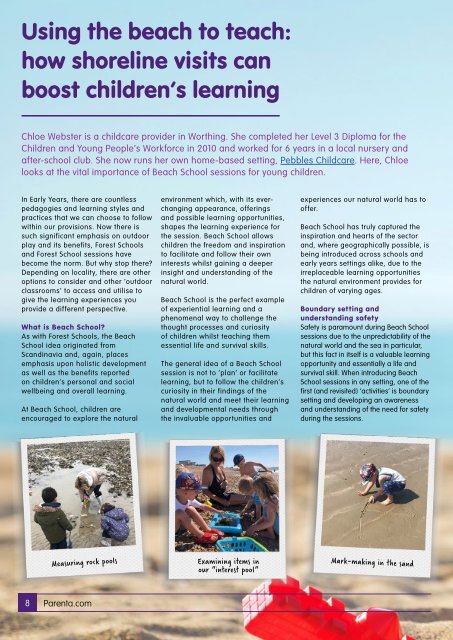Magazine August 2018
In this month’s edition of the magazine, we’ve brought you an article on the benefits of shoreline learning from Pebbles Childcare and a whole host of fantastic ideas for water play by Tamsin Grimmer. Does your setting make the most of off-site visits? If not, we’ve included an article on why they’re so important on page 10.
In this month’s edition of the magazine, we’ve brought you an article on the benefits of shoreline learning from Pebbles Childcare and a whole host of fantastic ideas for water play by Tamsin Grimmer. Does your setting make the most of off-site visits? If not, we’ve included an article on why they’re so important on page 10.
Create successful ePaper yourself
Turn your PDF publications into a flip-book with our unique Google optimized e-Paper software.
Using the beach to teach:<br />
how shoreline visits can<br />
boost children’s learning<br />
Chloe Webster is a childcare provider in Worthing. She completed her Level 3 Diploma for the<br />
Children and Young People’s Workforce in 2010 and worked for 6 years in a local nursery and<br />
after-school club. She now runs her own home-based setting, Pebbles Childcare. Here, Chloe<br />
looks at the vital importance of Beach School sessions for young children.<br />
In Early Years, there are countless<br />
pedagogies and learning styles and<br />
practices that we can choose to follow<br />
within our provisions. Now there is<br />
such significant emphasis on outdoor<br />
play and its benefits, Forest Schools<br />
and Forest School sessions have<br />
become the norm. But why stop there?<br />
Depending on locality, there are other<br />
options to consider and other ‘outdoor<br />
classrooms’ to access and utilise to<br />
give the learning experiences you<br />
provide a different perspective.<br />
What is Beach School?<br />
As with Forest Schools, the Beach<br />
School idea originated from<br />
Scandinavia and, again, places<br />
emphasis upon holistic development<br />
as well as the benefits reported<br />
on children’s personal and social<br />
wellbeing and overall learning.<br />
At Beach School, children are<br />
encouraged to explore the natural<br />
environment which, with its everchanging<br />
appearance, offerings<br />
and possible learning opportunities,<br />
shapes the learning experience for<br />
the session. Beach School allows<br />
children the freedom and inspiration<br />
to facilitate and follow their own<br />
interests whilst gaining a deeper<br />
insight and understanding of the<br />
natural world.<br />
Beach School is the perfect example<br />
of experiential learning and a<br />
phenomenal way to challenge the<br />
thought processes and curiosity<br />
of children whilst teaching them<br />
essential life and survival skills.<br />
The general idea of a Beach School<br />
session is not to ‘plan’ or facilitate<br />
learning, but to follow the children’s<br />
curiosity in their findings of the<br />
natural world and meet their learning<br />
and developmental needs through<br />
the invaluable opportunities and<br />
experiences our natural world has to<br />
offer.<br />
Beach School has truly captured the<br />
inspiration and hearts of the sector<br />
and, where geographically possible, is<br />
being introduced across schools and<br />
early years settings alike, due to the<br />
irreplaceable learning opportunities<br />
the natural environment provides for<br />
children of varying ages.<br />
Boundary setting and<br />
understanding safety<br />
Safety is paramount during Beach School<br />
sessions due to the unpredictability of the<br />
natural world and the sea in particular,<br />
but this fact in itself is a valuable learning<br />
opportunity and essentially a life and<br />
survival skill. When introducing Beach<br />
School sessions in any setting, one of the<br />
first (and revisited) ‘activities’ is boundary<br />
setting and developing an awareness<br />
and understanding of the need for safety<br />
during the sessions.<br />
As with Forest School, it is a good<br />
idea to set a parameter on where<br />
your sessions will be held; allowing<br />
the children adequate space and<br />
freedom to explore whilst ensuring<br />
that they have an understanding of the<br />
boundaries and the parameters which<br />
they must stay within to ensure their<br />
safety. Similarly, a signal can be used<br />
which all children will understand,<br />
hear and recognise to indicate to<br />
them that they must return to your<br />
‘base’ immediately. These lessons are<br />
essential to the smooth integration<br />
of Beach School sessions into your<br />
setting’s routines and should be<br />
revisited each time you visit the beach<br />
for the first month or so until every<br />
child has had adequate practice and<br />
fully understands the boundaries in<br />
place.<br />
As practitioners, our role at Beach<br />
School should be the ‘knowledgeable<br />
other’ rather than the ‘leader’;<br />
learning and play during Beach<br />
School sessions should be led by<br />
the children and their curiosity and<br />
exploration. We are merely the<br />
facilitators of the environment and<br />
there to support and develop the<br />
children’s learning by introducing new<br />
words, skills and understanding, not<br />
to lead or attempt to change their<br />
play in any way.<br />
A learning experience throughout<br />
the year<br />
Also important to mention is that<br />
Beach School should not just be a<br />
‘summer’ experience; our natural<br />
world changes with the seasons and<br />
our children should not only be aware<br />
of this and what this looks like and<br />
means for the environment, but they<br />
should be exposed to it.<br />
Our setting launched our weekly<br />
Beach School sessions in January<br />
<strong>2018</strong>, amidst bitter winds, the biting<br />
cold and even snow as the winter<br />
progressed. Despite their initial<br />
reluctance, the children are now<br />
completely confident within their<br />
beach environment, have a full<br />
understanding of the beach and its<br />
varying appearances through the<br />
seasons, and ultimately a respect and<br />
understanding of the sea and basic<br />
life skills when it comes to open water<br />
and exploring such risky environments.<br />
Some settings also choose to limit<br />
their Beach School sessions to<br />
those children in their pre-school<br />
or primary cohort. As a homebased<br />
childcare provider, I<br />
deem this unnecessary and<br />
frankly not conducive to<br />
the service and outdoor<br />
learning opportunities I<br />
promote. In my opinion,<br />
no child is ‘too young’<br />
to be exposed to the<br />
elements or outdoor play<br />
and Beach School is a<br />
fine example of this. As<br />
a result, in my setting,<br />
we now have two-yearolds<br />
who can confidently<br />
identify whether the tide is<br />
coming in or out and differentiate<br />
between ‘cuttlefish’ and other<br />
sea-based objects; for me that in<br />
itself demonstrates the benefits<br />
of Beach School sessions<br />
for all within the Early<br />
Years.<br />
Where your geographical location<br />
allows, embark on Beach School<br />
training and begin to introduce<br />
these sessions into your settings and<br />
routines at least once a week. Not only<br />
does this promote outdoor learning<br />
and risky play, but the learning<br />
opportunities, experiences and life<br />
skills that children gain from the<br />
freedom of nature are truly remarkable<br />
and difficult to replicate within the<br />
walls of your garden or outdoor play<br />
space.<br />
As ‘outdoor classrooms’ go, the<br />
beach truly is an invaluable learning<br />
resource.<br />
Measuring rock pools<br />
Examining items in<br />
our “interest pool”<br />
Mark-making in the sand<br />
8 Parenta.com <strong>August</strong> <strong>2018</strong> 9

















